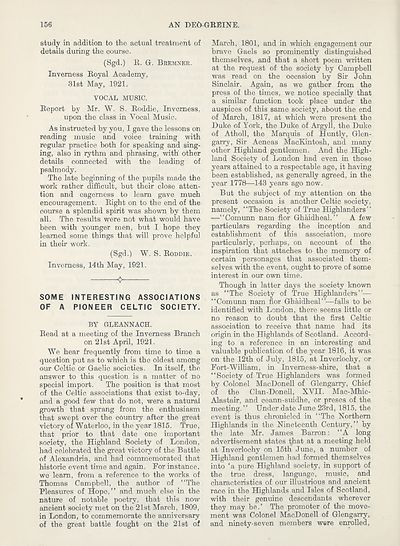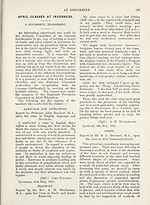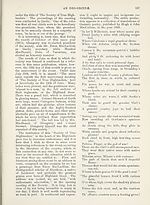An Comunn Gàidhealach Publications > Deo-gréine > Volume 16, October 1920-September 1921
(164) Page 156
Download files
Complete book:
Individual page:
Thumbnail gallery: Grid view | List view

156
AN DEO-GREINE.
study in addition to the actual treatment of
details during the course.
(Sgd.) R. G-. Bremner.
Inverness Royal Academy,
31st May, 1921.
VOCAL MUSIC.
Report by Mr. W. S. Roddie, Inverness,
upon the class in Vocal Music.
As instructed by you, I gave the lessons on
reading music and voice training with
regular practice both for speaking and sing¬
ing, also in rythm and phrasing, with other
details connected with the leading of
psalmody.
The late beginning of the pupils made the
work rather difficult, but their close atten¬
tion and eagerness to learn gave much
encouragement. Right on to the end of the
course a splendid spirit was shown by them
all. The results were not what would have
been with younger men, but I hope they
learned some things that will prove helpful
in their work.
(Sgd.) W. S. Roddie.
Inverness, 14th May, 1921.
<>
SOME INTERESTING ASSOCIATIONS
OF A PIONEER CELTIC SOCIETY.
BY GLEANNACH.
Read at a meeting of the Inverness Branch
on 21st April, 1921.
We hear frequently from time to time a
question put as to which is the oldest among
our Celtic or Gaelic societies. In itself, the
answer to this question is a matter of no
special import. The position is that most
of the Celtic associations that exist to-day,
and a good few that do not, were a natural
growth that sprang from the enthusiasm
that swept over the country after the great
victory of Waterloo, in the year 1815. True,
that prior to that date one important
society, the Highland Society of London,
had celebrated the great victory of the Battle
of Alexandria, and had commemorated that
historic event time and again. For instance,
we learn, from a reference to the works of
Thomas Campbell, the author of “The
Pleasures of Hope,’’ and much else in the
nature of notable poetry, that this now
ancient society met on the 21st March, 1809,
in London, to commemorate the anniversary
of the great battle fought on the 21st of
March, 1801, and in which engagement our
brave Gaels so prominently distinguished
themselves, and that a short poem written
at the request of the society by Campbell
was read on the occasion by Sir John
Sinclair. Again, as we gather from the
press of the times, we notice specially that
a similar function took place under the
auspices of this same society, about the end
of March, 1817, at which were present the
Duke of York, the Duke of Argyll, the Duke
of Atholl, the Marquis of Huntly, Glen¬
garry, Sir Aeneas MacKintosh, and many
other Highland gentlemen. And the High¬
land Society of London had even in those
years attained to a respectable age, it having
been established, as generally agreed, in the
year 1778—143 years ago now.
But the subject of my attention on the
present occasion is another Celtic society,
namely, “The Society of True Highlanders’’
—“Comunn nam fior Ghaidheal. ” A few
particulars regarding the inception and
establishment of this association, more
particularly, perhaps, on account of the
inspiration that attaches to the memory of
certain personages that associated them¬
selves with the event, ought to prove of some
interest in our own time.
Though in latter days the society known
as “The Society of True Highlanders”—
“Comunn nam fior Ghkidheal”—falls to be
identified with London, there seems little or
no reason to doubt that the first Celtic
association to receive that name had its
origin in the Highlands of Scotland. Accord¬
ing to a reference in an interesting and
valuable publication of the year 1816, it was
on the 12th of July, 1815, at Inverlochy, or
Fort-William, in Inverness-shire, that a
“Society of True Highlanders was formed
by Colonel MacDonell of Glengarry, Chief
of the Clan-Don ell, XVII. Mac-Mhic-
Alastair, and ceann-suidhe, or preses of the
meeting. ’ ’ Under date June 23rd, 1815, the
event is thus chronicled in “The Northern
Highlands in the Nineteenth Century,” by
the late Mr. James Barron: “A long
advertisement states that at a meeting held
at Inverlochy on 15th June, a number of
Highland gentlemen had formed themselves
into ‘a pure Highland society, in support of
the true dress, language, music, and
characteristics of our illustrious and ancient
race in the Highlands and Isles of Scotland,
with their genuine descendants wherever
they may be.’ The promoter of the move¬
ment was Colonel MacDonell of Glengarry,
and ninety-seven members were enrolled,
AN DEO-GREINE.
study in addition to the actual treatment of
details during the course.
(Sgd.) R. G-. Bremner.
Inverness Royal Academy,
31st May, 1921.
VOCAL MUSIC.
Report by Mr. W. S. Roddie, Inverness,
upon the class in Vocal Music.
As instructed by you, I gave the lessons on
reading music and voice training with
regular practice both for speaking and sing¬
ing, also in rythm and phrasing, with other
details connected with the leading of
psalmody.
The late beginning of the pupils made the
work rather difficult, but their close atten¬
tion and eagerness to learn gave much
encouragement. Right on to the end of the
course a splendid spirit was shown by them
all. The results were not what would have
been with younger men, but I hope they
learned some things that will prove helpful
in their work.
(Sgd.) W. S. Roddie.
Inverness, 14th May, 1921.
<>
SOME INTERESTING ASSOCIATIONS
OF A PIONEER CELTIC SOCIETY.
BY GLEANNACH.
Read at a meeting of the Inverness Branch
on 21st April, 1921.
We hear frequently from time to time a
question put as to which is the oldest among
our Celtic or Gaelic societies. In itself, the
answer to this question is a matter of no
special import. The position is that most
of the Celtic associations that exist to-day,
and a good few that do not, were a natural
growth that sprang from the enthusiasm
that swept over the country after the great
victory of Waterloo, in the year 1815. True,
that prior to that date one important
society, the Highland Society of London,
had celebrated the great victory of the Battle
of Alexandria, and had commemorated that
historic event time and again. For instance,
we learn, from a reference to the works of
Thomas Campbell, the author of “The
Pleasures of Hope,’’ and much else in the
nature of notable poetry, that this now
ancient society met on the 21st March, 1809,
in London, to commemorate the anniversary
of the great battle fought on the 21st of
March, 1801, and in which engagement our
brave Gaels so prominently distinguished
themselves, and that a short poem written
at the request of the society by Campbell
was read on the occasion by Sir John
Sinclair. Again, as we gather from the
press of the times, we notice specially that
a similar function took place under the
auspices of this same society, about the end
of March, 1817, at which were present the
Duke of York, the Duke of Argyll, the Duke
of Atholl, the Marquis of Huntly, Glen¬
garry, Sir Aeneas MacKintosh, and many
other Highland gentlemen. And the High¬
land Society of London had even in those
years attained to a respectable age, it having
been established, as generally agreed, in the
year 1778—143 years ago now.
But the subject of my attention on the
present occasion is another Celtic society,
namely, “The Society of True Highlanders’’
—“Comunn nam fior Ghaidheal. ” A few
particulars regarding the inception and
establishment of this association, more
particularly, perhaps, on account of the
inspiration that attaches to the memory of
certain personages that associated them¬
selves with the event, ought to prove of some
interest in our own time.
Though in latter days the society known
as “The Society of True Highlanders”—
“Comunn nam fior Ghkidheal”—falls to be
identified with London, there seems little or
no reason to doubt that the first Celtic
association to receive that name had its
origin in the Highlands of Scotland. Accord¬
ing to a reference in an interesting and
valuable publication of the year 1816, it was
on the 12th of July, 1815, at Inverlochy, or
Fort-William, in Inverness-shire, that a
“Society of True Highlanders was formed
by Colonel MacDonell of Glengarry, Chief
of the Clan-Don ell, XVII. Mac-Mhic-
Alastair, and ceann-suidhe, or preses of the
meeting. ’ ’ Under date June 23rd, 1815, the
event is thus chronicled in “The Northern
Highlands in the Nineteenth Century,” by
the late Mr. James Barron: “A long
advertisement states that at a meeting held
at Inverlochy on 15th June, a number of
Highland gentlemen had formed themselves
into ‘a pure Highland society, in support of
the true dress, language, music, and
characteristics of our illustrious and ancient
race in the Highlands and Isles of Scotland,
with their genuine descendants wherever
they may be.’ The promoter of the move¬
ment was Colonel MacDonell of Glengarry,
and ninety-seven members were enrolled,
Set display mode to:
![]() Universal Viewer |
Universal Viewer | ![]() Mirador |
Large image | Transcription
Mirador |
Large image | Transcription
| An Comunn Gàidhealach > An Comunn Gàidhealach Publications > Deo-gréine > Volume 16, October 1920-September 1921 > (164) Page 156 |
|---|
| Permanent URL | https://digital.nls.uk/125655955 |
|---|
| Description | Leabhar 16, Mìos Deireannach an Fhogharaidh 1920 gu Darna Mìos an Fhoghair 1921 |
|---|---|
| Attribution and copyright: |
|
| Description | This contains items published by An Comunn, which are not specifically Mòd-related. It includes journals, annual reports and corporate documents, policy statements, educational resources and published plays and literature. It is arranged alphabetically by title. |
|---|
| Description | A collection of over 400 items published by An Comunn Gàidhealach, the organisation which promotes Gaelic language and culture and organises the Royal National Mòd. Dating from 1891 up to the present day, the collection includes journals and newspapers, annual reports, educational materials, national Mòd programmes, published Mòd literature and music. |
|---|---|
| Additional NLS resources: |
|

